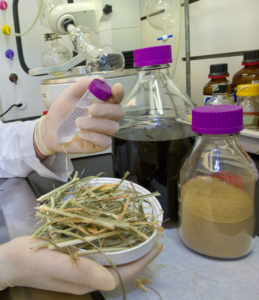Applications
- Production of biofuels, sustainable aviation fuels (SAF), and bioproducts in commercial biorefineries
Advantages/Benefits
- Easier and more efficient processing of diverse biomass feedstocks, including agricultural residues, hardwood sawdust, and tropical fibers
- Cost-effective and reusable solvents for sustainable operations
- Higher sugar recovery yields for biofuel and bioproduct production
- Scalable and equipment-free solution
Background
Lignocellulosic biomass is a renewable and abundant resource with significant potential for producing biofuels and bioproducts. However, traditional pretreatment methods are often costly, inefficient, and require complex washing and specialized equipment, limiting their commercial scalability. This invention introduces distillable ionic liquids (DILs) as an innovative solution, enabling efficient and sustainable pretreatment of various biomass types, regardless of their origin or composition.
Technology Overview
Researchers at Berkeley Lab have developed an innovative method for biomass pretreatment using distillable ionic liquids (DILs), such as ethanolammonium acetate and butylammonium acetate. These solvents enable efficient deconstruction of lignocellulosic feedstocks under mild conditions. Operating at 15% solid loading and 140°C, the process achieved high sugar yields, with glucose recovery exceeding 85% for hay and palm oil fiber and over 90% for sorghum. Additionally, the technology ensures cost-effectiveness with solvent recovery rates surpassing 95% through simple vacuum distillation. This method works with many types of biomass, including agricultural residues, hardwood sawdust, and tropical fibers. It offers a scalable and sustainable solution for producing biofuels and bioproducts.
Development Stage
Proof of Concept
Investigator(s)
- Xueli Chen
- Joseph Palasz
- Anagha Krishnamoorthy
- Venkataramana R. Pidatala
- Blake A. Simmons
Status
Patent pending
Opportunities
Available for licensing or collaborative research
